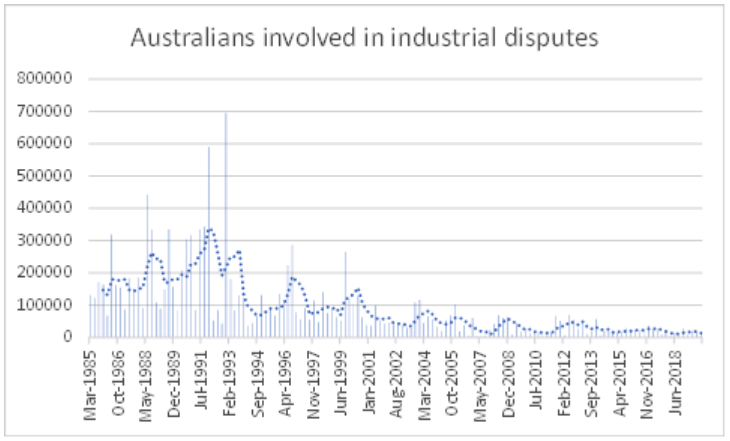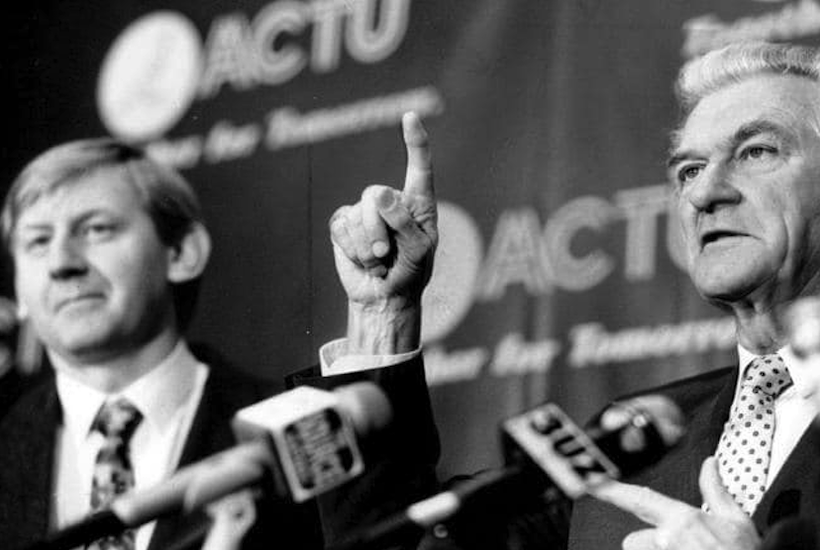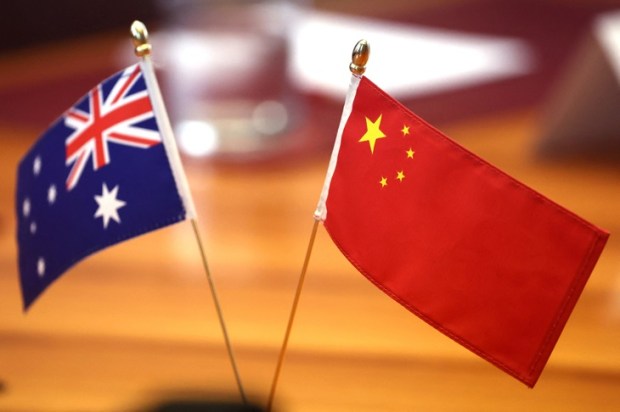PM Scott Morrison echoed Menzies when he claimed the last Australian election for the “quiet Australians” – the C21 equivalent of Menzies’s “forgotten people”, or Howard’s “battlers”.
But something happened when the Coronavirus struck.
First, we had a government stimulus package that dwarfed Kevin Rudd’s “Go hard, go households” post GFC pump prime by hundreds of percent.
Australia is spending perhaps 10% of GDP propping-up and protecting individuals and businesses from the effects of the virus – much more than just about anywhere else in the world. It comes to about twice what is being spent in countries like New Zealand, the UK, Canada, and Germany; and more than 4 times countries like Italy, France and South Korea. This is not Menzies or Howard.
Now it has got worse. The Australian reports:
Scott Morrison will urge a new industrial compact between workers, employers, unions and government to boost employment and forge a remodelled economy after the pandemic, while signalling a new and more effective federation emerging from the crisis.
Morrison then goes on to forecast:
The Prime Minister said he had low expectations that the Labor Party, however, would be a willing partner in economic reform, accusing Anthony Albanese of reverting to a “fighting Tories” mentality at a time when the union movement was being constructive.
This is pure Bob Hawke, the great conciliator whose corporatist model brought us some needed economic reform, but at the cost of entrenching a “worker” aristocracy heading the union movement, insulated against a radical decline in membership while buying power and influence in Australian politics, via control of award mandated superannuation empires.
It sounds like Morrison is contemplating another summit followed by an accord. This is not the path a Liberal Prime Minister should be treading.
Summits are a bad idea, Kevin Rudd’s 2020 summit being the quintessential example.
Parliament is a perpetual summit that has served us well for 120 years at a federal level, and even longer than that in the states. It works because it is rooted in the demos. Its participants have to be resourceful enough to muster the wherewithal to get elected, and intelligent, persuasive and charismatic enough to convince parties and people to support them. And when they make a decision they are accountable to their electors and preselectors.
Summits are full of people who wouldn’t be there, except for their employment, and are unshackled from any real accountability to anyone, sometimes even their own boards. I’m talking about bureaucrats and CEOs of companies and lobby groups.
That doesn’t include trade unions, most of whom understand the political process better than politicians because they have a constituency, and competitors for that constituency more ruthless than anything the non-Labor side experiences.
One of the lessons of the Hawke summits was that trade union operators run rings around most of the professional politicians, and corral the companies and lobby groups into sub-optimal deals. Another is that corporate Australia thinks only short-term, and while it bankrolls non-Labor, won’t back it when things get tough.
I don’t think Morrison is such an outstanding politician that he will be able to manage his summit to the sort of conclusion that he wants and needs. And if he doesn’t, and then refuses to go along with the outcome, he will be the one, rather than Albanese who is ultimately seen as divisive.
In fact, the deal that A-G Christian Porter did with the ACTU over the JobKeeper allowance, which exposes businesses to arbitration in the Fair Work Commission, demonstrates just how a wily union movement will eat the government alive.
Allowing a Fair Work commissioner to tell a business how it can run is a return to the bad old days, before even the Wages and Incomes Accords. Business doesn’t need it, and neither do the employees, but it is a boon for union reps.
While COVID-19 has affected the decision-making processes of the government, it has changed our habits and shown that business can be done in a much more decentralised and flexible way, so there are opportunities to change the way we earn a living and make it more flexible and productive.
There should also be a recognition that after this terrible blow we need to do things better to claw back lost livelihoods and dreams.
After Australia’s flirtation with an authoritarian healthocracy there is a natural yearning amongst the public for freedom, which can be channelled.
But summits tend to lead to increased centralisation because they attract control freaks who want to impose centralised, one-size-fits-all solutions that give them a saviour role. This is not the Liberal way.
When you look at economic data it is clear that John Howard’s empowerment of the individual, which created the modern phenomenon of the self-employed, tradie/contractor, for example, has led to a more harmonious, richer Australia, than the centralised wages accords ever did.
One indicator of harmony, industrial disputes, are orders of magnitude less than they were in the 80s and early 90s, and union membership has also precipitately declined (largely because most workers have no need of a third party to talk to their boss).
 Source: 6321.0.55.001 – Industrial Disputes, Australia, Dec 2019
Source: 6321.0.55.001 – Industrial Disputes, Australia, Dec 2019
Howard’s one mistake was to centralise the wage system, taking power from the states and handing it to the Commonwealth. This made possible Julia Gillard’s rolling back of not only his earlier reforms, but those of Hawke and Keating as well. Centralisation is not generally a good idea even if it suits your short term agenda.
Morrison should also be suspicious of the sort of expert opinion that dominates at talkfests. What better evidence for the failings of experts than the epidemiological models that have been peer-reviewed, held in esteem by professional organisations, come with accolades and honours, yet been wrong by orders of magnitude.
So Scott, think again. We employ you to make decisions, and we trust Parliaments to make them with you. Extra-parliamentary forums ought to be used with care. They are anti-democratic, they tend to centralise and complicate issues that ought to be left to individuals, and they give self-appointed experts power to promulgate their pet theories.
You come from a political tradition that is democratic, suspicious of unaccountable power, and which believes individuals are best suited to judge their own interests and take responsibility for their own decisions.
It’s a tradition that is responsible for the high standards of living that we enjoy, and is copied by tens of countries around the world. It is not too late to rethink your position and come back to the liberal mainstream.
We don’t need an accord and more government, we need less, much less government.
Illustration: National Library of Australia.
Got something to add? Join the discussion and comment below.
Got something to add? Join the discussion and comment below.
Get 10 issues for just $10
Subscribe to The Spectator Australia today for the next 10 magazine issues, plus full online access, for just $10.


























Comments
Don't miss out
Join the conversation with other Spectator Australia readers. Subscribe to leave a comment.
SUBSCRIBEAlready a subscriber? Log in